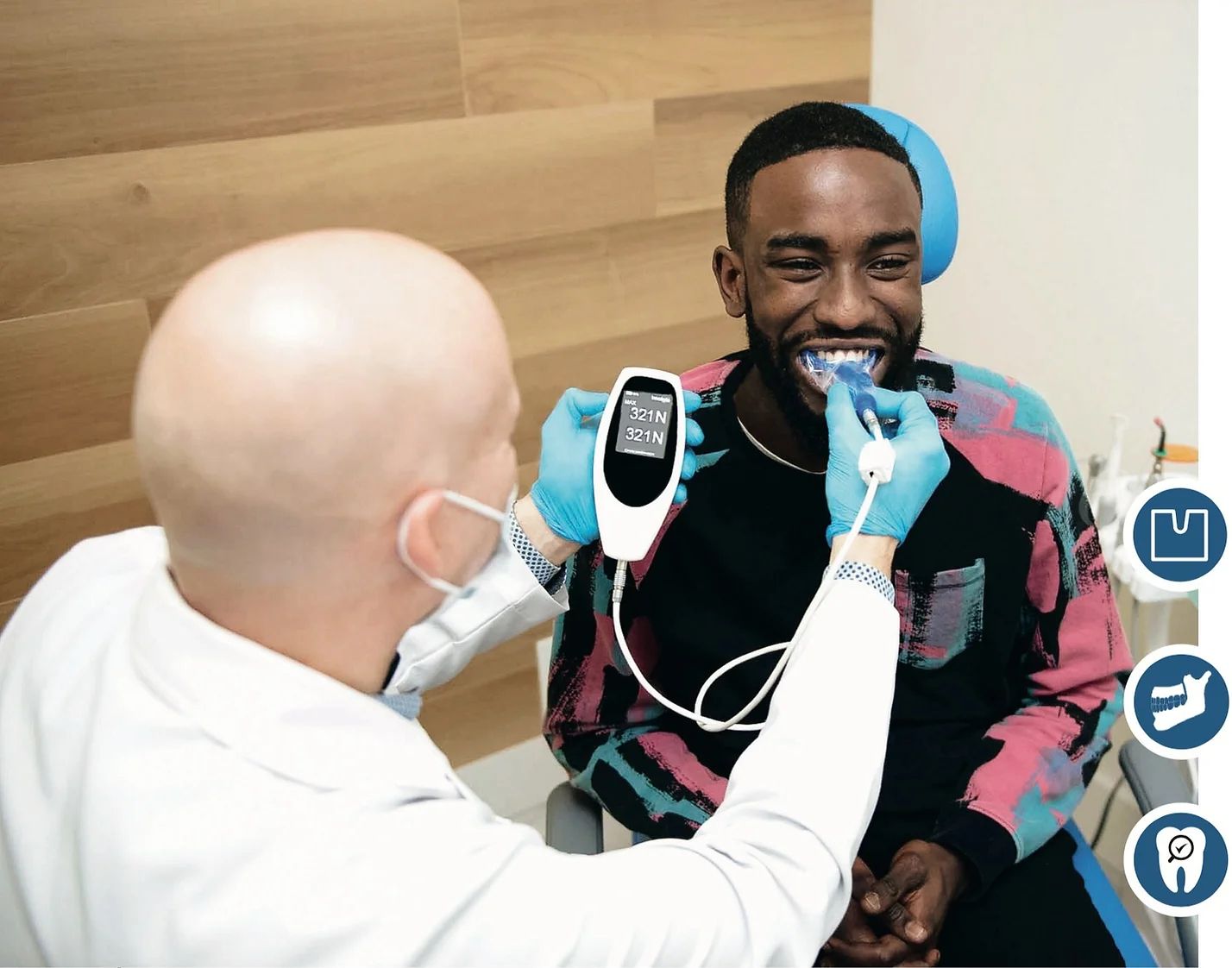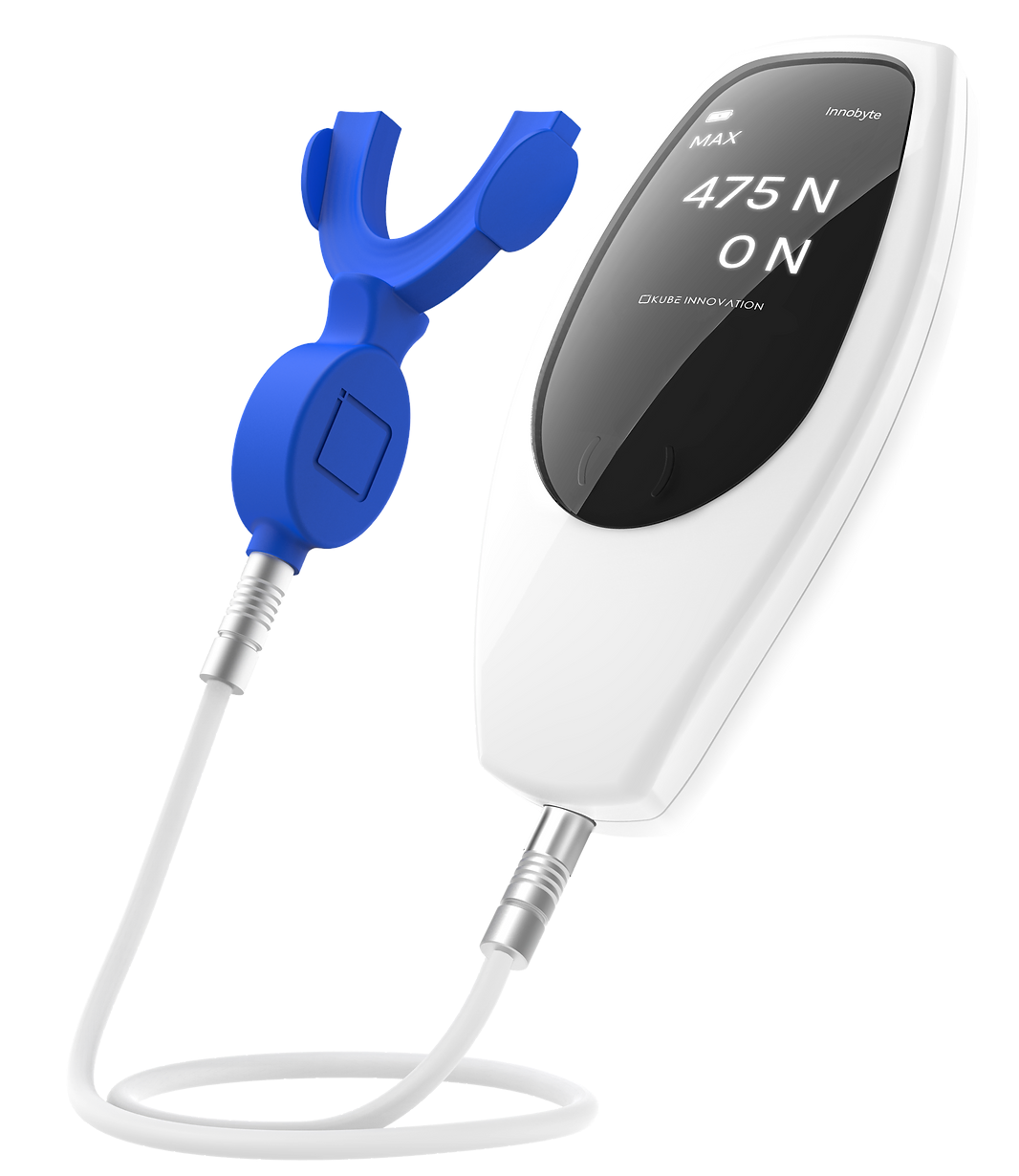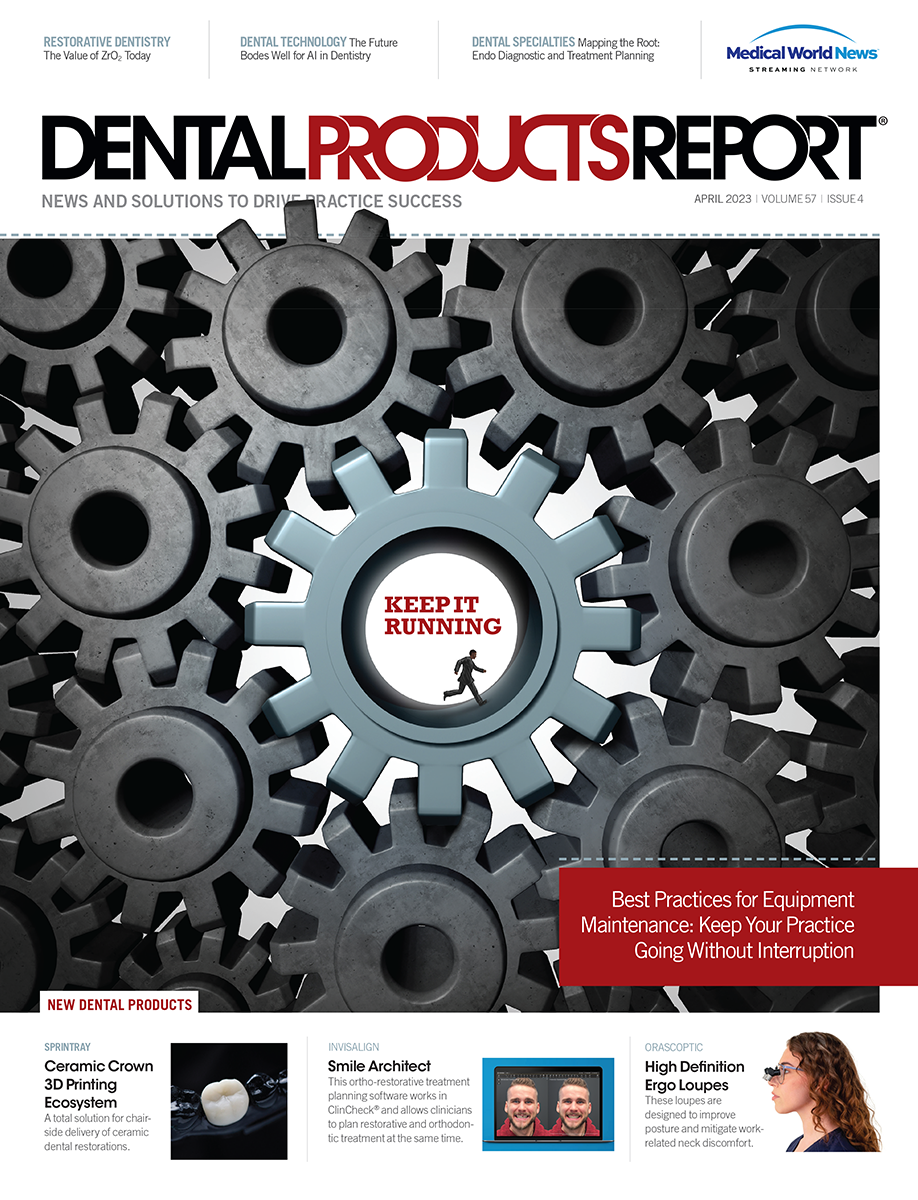The idea for Innobyte, a device that measures bite force, sprang from a conversation between an aerospace engineer and a dentist.
Innobyte™
The Innobyte is a handheld device that measures an edentulous patient’s bite force to determine whether they need a prosthesis or bridge on their dental implants. Innobyte touts instant results for a quick and painless consultation. It is said to be precise, reliable, and relatively easy to use. As premature restoration failures are born from excessive bite force, this device can be a powerful tool to ensure the longevity of restorations.
Kube Innovation
514-400-3713 | kubeinnovation.com
Frédérik Marcil, a then 20-something who had always dreamed of running his own business, was looking for an idea to pursue when he asked his best friend’s father, a dentist, what was missing in his practice. His answer? The ability to measure bite force. He told Marcil such a device would be a game changer, and would allow him to improve patient education while also increasing case acceptance.
After some research, Marcil realized there was nothing on the market that allowed dentists to gather this critical information. So, he set out to change that, founding Kube Innovation in 2015.
“I didn’t have a dental background at the time, but that initial doctor trained me and gave me a crash course on so many things,” Marcil says. “Over the years, I’ve picked up a lot; coming from an engineering background really helped me learn the technical side.”
Marcil and his team received regulatory approval in 2018 and approval from the FDA in 2021 to start selling the device in the United States. The Innobyte is also available in Canada, Europe, and parts of Asia, and Marcil has plans for continued expansion in the coming years.
The Early Days
When Marcil first started this project, he was working full-time as an aerospace engineer. He devoted his evenings and weekends to developing the device, but when his employer found out, he was told he had a month to decide between his job and his passion project. He chose the Innobyte, quitting his job and following his dream to become an entrepreneur with just $2000 in his bank account.
It took about 2 years to develop a working prototype, and from there Marcil selected a few dentists to participate in a trial run. He used their initial feedback to make improvements, eventually creating a solution that is easy to use and easy to integrate into every patient appointment.
“One of the most important things for me when creating this product was [that] I wanted to make sure anyone could take a bite force measurement without any instruction,” Marcil says. “I wanted to make it as user-friendly as possible. One of the features I love the most is [that] it’s a stand-alone product. There’s no computer to connect to, it’s just a battery-powered portable device that you insert into the patient’s mouth.”
Overcoming Hurdles
Of course, there were challenges during the development process, as there is with any new product. One was meeting the regulatory requirements for this medical device, a time-consuming process Marcil had not anticipated.
Another was setting standards. Because there was no other device on the market like the Innobyte, there were no standards in terms of what was normal, excessive, or deficient bite force. So, the team had to create them. They did this by measuring the bite force of 500 patients and correlating what they found with what was in the literature. Creating that initial reference chart was not easy, but it now serves as a guide for dentists using the device to measure bite force, helping them to determine the best treatment and material options for each patient.
Because of his age and lack of dental background, many dentists dismissed Marcil and his device at first. Dentists typically are not taught the importance of measuring bite force, he says, which made them skeptical. Although he has overcome that, education is still critical.
“The status quo is to not measure bite force,” Marcil says. “Many dentists don’t know how to use a device like this or that it even exists. Awareness is one of the biggest focuses we have as a company.”
The company is raising that awareness through scientific studies, Marcil says, with findings from several published over the past few months. Kube Innovation is also partnering with universities to implement courses on bite force and how it affects treatment as well as quality of life.
How It Works
Using the Innobyte is fairly simple. To start, patients bite down as hard as they can on the mouthpiece. The company’s patented technology then converts the force applied on the mouthpiece to a true value that displays on the screen, Marcil says. Values are displayed the instant the patient bites down.
Once the results are in, the dentist compares the value to the reference chart Marcil and his team created. There are 3 possible outcomes: normal bite force, excessive bite force, and deficient bite force.
If the bite force is more than 1000 N, it is too high, and that will impact treatment recommendations and the types of materials used, Marcil says. For example, these patients, who are typically grinders and bruxers, are not good candidates for fillings because they will likely fail, making crowns a better treatment option.
Patients with deficient bite forces are typically missing teeth or are edentulous and could benefit from implants, Marcil says. Seeing the number on the device come up as deficient and being further educated on the bite force needed to eat certain foods makes it easier for patients to accept their condition—and more open to considering treatment options that can improve their quality of life.
“It’s a great tool to educate patients on either side of the spectrum,” Marcil says. “It helps them understand the limitations of their current condition and why the treatment plan is being proposed.”
Implementing Innobyte Into Your Practice
The Innobyte is easy to add to appointments, with almost no training required, Marcil says. It takes about 5 minutes to demonstrate how it works, then anyone on the team should be able to use it. Results are available in about 30 seconds, so it doesn’t add much, if any, time to the appointment.
“The beauty of this product is it’s so user-friendly,” he notes, “which is especially important when there’s so much turnover. Dentists need products that are easy to use.”
Bite Force
30 seconds
Time it takes for the Innobyte to measure bite force
$100,000
Average amount of additional revenue dentists who use Innobyte generate in the first year
Bite Force Ranges
- Normal: Between 650 and 1000 N for adults with full dentition
- Normal to excessive: 1000 N or more. These patients tend to be bruxers or grinders but aren’t expected to have dietary restrictions related to their bite force.
- Light deficit: 400 to 600 N. These patients will start to have difficulty with chewing or be unable to chew certain foods.
- Significant deficit: 200 to 400 N. These patients struggle to chew the foods needed for a healthy diet and may develop health problems.
- Serious deficit and critical deficit: 100 to 200 N and 0 to 100 N. These patients have limited chewing ability and can only chew with low strength, which leads to health problems related to their diet that negatively impact their quality of life. The deficits might stem from missing teeth, decreased musculature, mobile teeth, or pain.
The right restorative treatment will enable patients with deficient bite force to increase their bite force so they can improve their diet as well as their quality of life.
The hygienist, dental assistant, or anyone on the team can record a patient’s bite force and have it ready for the dentist to assess, Marcil says. Hygienists can then explain to patients what their results mean, and how a nightguard might help a patient who has excessive bite force, or the benefit of implants for a patient who has deficient bite force. That adds a lot of value to the appointment, helping patients really see the need for recommended treatment.
The Benefits for Your Practice
After implementing this easy-to-use device into your practice, you will find you are performing more crown and implant cases, Marcil says, increasing your bottom line. In fact, dentists who use Innobyte routinely place 41% more crowns in the first year and 41% more implants. Dentists also experience a 69% increase in nightguard cases.
With Innobyte, patients have a better understanding of their condition—and that makes them more likely to accept treatment. Practices increase case acceptance and tend to see a significant return on investment just in the first month.
The device also offers clinicians peace of mind. They know they are giving their patients the best treatment and materials possible based on their condition, and that patients won’t be returning in a few weeks or months because their restoration failed.
A Better Life
Incorporating the Innobyte into your practice can improve your patients’ quality of life. The bite force readings help determine the best treatment for every patient and the best materials to use for that treatment, whether their numbers register as excessive or deficient.
Patients with excessive bite force, for example, receive durable restorations that will last because you know which treatments and materials won’t work for their condition.
“If patients get the wrong treatment or the wrong material, it can create chronic pain and all kinds of complications down the line,” Marcil says. “So for me, it’s critical to get all the necessary information before treatment to prevent that. It really boils down to preserving their quality of life.”
Then there are the patients with deficient bite force who have convinced themselves they can still eat anything they want, like steak. The Innobyte clearly demonstrates they really can’t—which is an important, yet tricky, conversation to have chairside.
“If the science says you need 600 N to eat a steak and the patient is below that bite force, they’re probably eating it in large pieces and swallowing it whole, and that affects their digestion,” Marcil says. “This device really provides that education so patients can see their limitations.”
Reasons to Make the Investment
Marcil has heard a lot of feedback from dentists successfully using the Innobyte, with most of them saying they don’t know how they would practice without it. He has also been told that patients really appreciate the product and the value it provides them, which is really what it’s all about.
The device improves patient communication, helping to ensure they get the treatment they need while also boosting your bottom line.
“It’s a simple patient education tool that really reduces the discussion time,” Marcil says. “It unequivocally demonstrates the need for treatment. Having a great tool like this can make a huge difference in the way dentists practice.”


